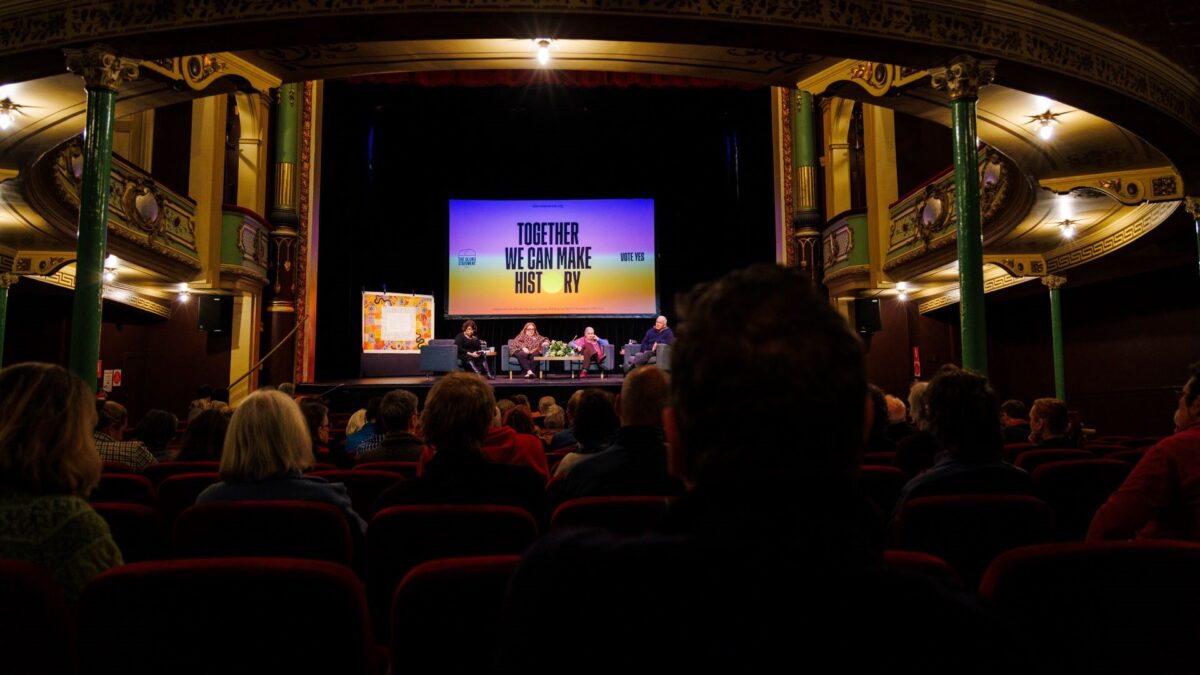Hobart hears key actions Aussies can take to spread word about Voice


Hobart's Theatre Royal hosted a special in-conversation event featuring Professor Megan Davis and Pat Abderson AO. (Image credit: Ben Fry / The Uluru Dialogue)
A leader of the Voice campaign has responded to a question she fields regularly from Australians who are wanting to know what they can do to help achieve a “Yes” result at the upcoming Referendum on a First Nations Voice to Parliament.
“Australians are caught in a kind of tug-of-war between ‘Yes’ and ‘No’, for all sorts of reasons; I could go on for hours about the lies being put out there about the Voice,” Professor Megan Davis said at Hobart’s Theatre Royal earlier this week.
Professor Davis and Pat Anderson AO are nearing the end of their national tour of Australia’s capital cities, during which they are discussing the concept of a Voice to Parliament and why it is so crucial to First Nations Peoples.

Professor Davis and Pat Anderson AO signed copies of their book at the Theatre Royal. (Image credit: Ben Fry / The Uluru Dialogue)
So far Prof. Davis and Ms Anderson and event host and fellow Uluru Dialogue leader Kirstie Parker have visited Melbourne, Sydney, Adelaide and Hobart, with Brisbane their next and final stop early next month.
The Co-Chairs of the Uluru Dialogue (the architects of the Uluru Statement from the Heart) have also been discussing and signing their book “Our Voices From The Heart” which details the Regional Dialogues process which led to the release of The Statement back in 2017.
“It’s been a very difficult campaign, but what we’ve found, at least in the work we do as the Uluru Dialogue - we’ve been running face to face meetings across the country since last year - is that when Aussies come in and hear the facts, without all of the disruptive noise which is happening around the Voice, they tend to leave as ‘Yes’ voters,” Prof. Davis said.
“Whether it’s Far North Queensland, Central Queensland, Southeast Queensland, regional and remote New South Wales, we’ve had lots of ‘No’ people who have come in and left as ‘Yes’.
“What we think is going on is that if you yarn to other Aussies who are concerned, are ‘No’ voters or who are undecided, and there’s huge numbers of undecideds, and they come to understand why our people seek the Voice, why they want it - and that as our polling shows, over 80 per cent of First Nations peoples are behind it - Australians come on board.
“It’s simply not true that the majority of our mob aren’t in favour of the Voice.
“One thing every supportive Aussie can do in the short time remaining before the referendum is to talk to two other people and persuade them of the exigency of the Voice and why it is so important.
“We’re so far down the track now that I don’t know how the country recovers from a ‘No’ result - reconciliation processes, the RAPs, there’s a lot to be said if this goes down that route.
“There aren’t enough of us First Nations Peoples to do this alone. We’re really relying on is Australians to work with us, to yarn with other Aussies and walk them through it.
“It’s tiring work, it takes a lot of time, it’s resource intensive and time-intensive, but it’s worth it. A ‘Yes’ result provides so much, not just to our mob but to the entire nation.”
Pat Anderson AO in Hobart outlined a key reason of the urgency of the Voice for First Nations Peoples.
“It’s a universal truism that when you’re involving the people about who you’re making decisions and setting laws and policies for, you get better governance, you get better laws, better everything and resources will finally get to where they’re targeted, which isn’t happening now,” Ms Anderson said at the Theatre Royal.
The Uluru Dialogue will hold its Brisbane information event on Thursday 5 October, with details to be released at ulurustatement.org
